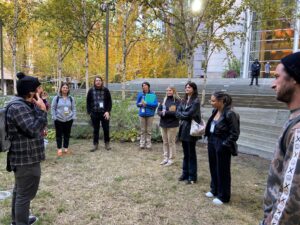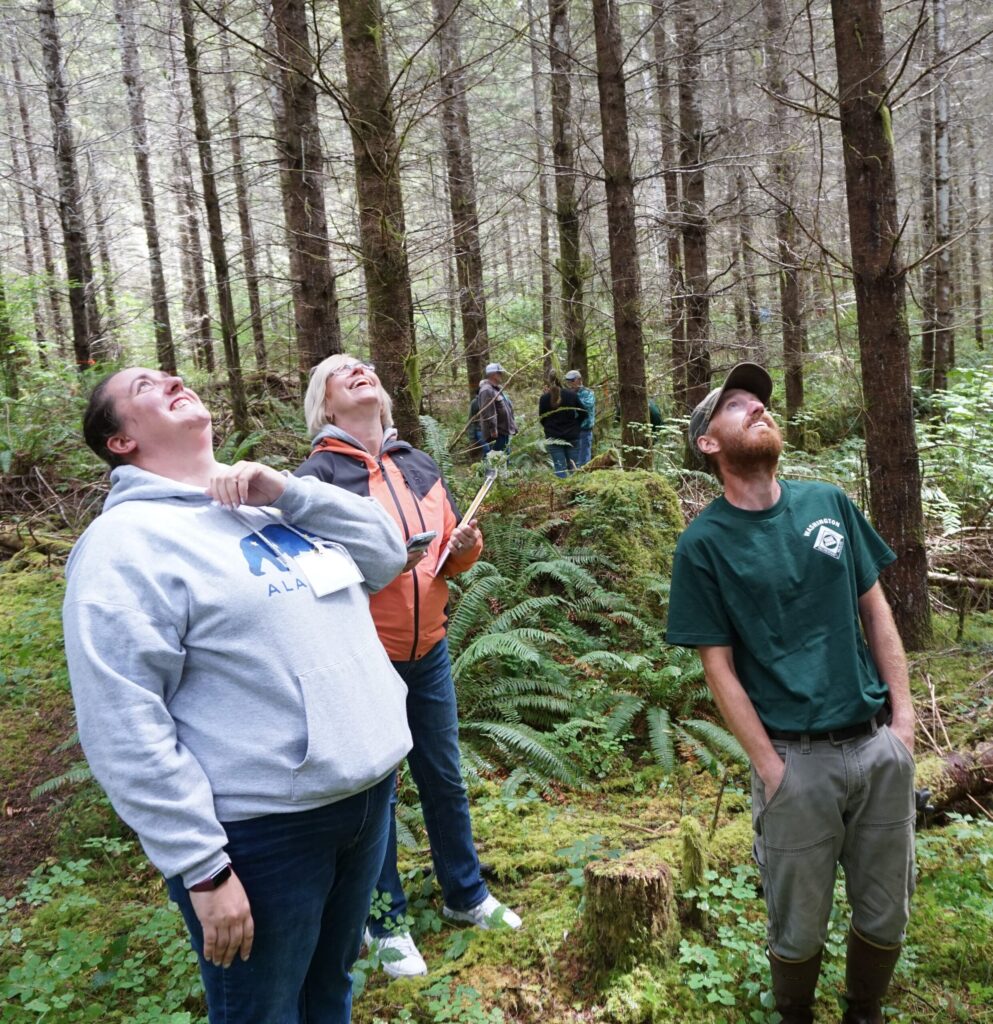In the years that PEI has been working with the Sustainable Forestry Initiative (SFI), many memorable moments have occurred. One that stands out for PEI Program Director Denise Buck occurred during a site visit on the Olympic Peninsula in preparation for a teacher workshop. “Our coastal coordinator was with SFI’s Tom Shorey looking at the field where they were planning to take the teachers and when they got back to her car, almost her entire door had been torn off by a bear,” says Buck. “There must have been something interesting in her car, at least to the bear.”
While bear encounters are not typical for SFI workshops, the national organization’s education and outreach efforts are often conducted in

and around forests in support of its mission to advance sustainability through forest-focused collaboration. Forest management companies can earn an SFI certification by meeting sustainability standards that ensure their forestry practices are environmentally responsible, socially beneficial and economically viable. Regionally, SFI-certified companies participate in SFI Implementation Committees (SICs) and pool their resources to partner with PEI to provide learning opportunities for teachers through the award-winning Project Learning Tree program.
“We have 35 SICs across the U.S. and Canada,” explains Gordy Mouw, SFI’s Director of Network Relations. “Every SIC has its own budget. When they want to do education and outreach, they do that collectively instead of each company doing it individually.”
“What makes the PLT network so impactful is this idea that we can achieve more through collaboration. How do we leverage each other’s expertise and resources to amplify our impact? Whether it’s managing forests for a specific outcome or creating a workshop for educators, we tailor our approach to meet the needs of the people we’re working with.”
— Jennifer Byerly, Director of Communications, Project Learning Tree and Sustainable Forestry Initiative
That’s where PEI comes in. SFI provides funding for PEI to conduct PLT workshops, facilitate worksite tours on SIC-member lands, and offer ongoing support for teachers to implement forestry education with students. In Washington State, the model is working so well that Mouw considers it an example for other states. “The bar has been set high,” he says.
Jennifer Byerly is the Director of Communications for both PLT and SFI. She believes that collaboration is the key to success for both organizations. “What makes the PLT network so impactful is this idea that we can achieve more through collaboration,” Byerly explains. “How do we leverage each other’s expertise and resources to amplify our impact? Whether it’s managing forests for a specific outcome or creating a workshop for educators, we tailor our approach to meet the needs of the people we’re working with. That’s what makes this model so effective.”
One recent example of that effectiveness is a partnership with the Yakama Nation in which PEI provided PLT workshops and a forest tour for natural resources staff and educators. The project helped educators offer opportunities for youth to investigate green career pathways that could enable them to stay in their community.
“For our latest collaboration between PEI, the Washington SIC, and the Yakama Nation, we saw the impact reflected in the workshop photos

of students deeply concentrating while learning about the forests in their area,” says Byerly. “Workshop participants wrote about the importance of keeping the Nation’s young people engaged and aware of Tribal forestry efforts and career opportunities, with one person sharing, ‘I want the youth to gain an understanding of our lands and resources so that they can learn to appreciate and care for it.’”
PLT workshops help to change educators’ perceptions around forest management and forestry careers, Buck notes. At a Community Engaged in Forest Education workshop last August, one of the participants reflected, “I used to think that logging was bad and had little to offer as a career. Now I understand that the timber industry can be good land stewards and provide careers for many interests. My students will get excited about making connections to trees around their community and thinking of ways to help sustain the ecosystem.”
“That comment was really what SFI does in a nutshell,” says Buck. “It’s letting people know that there are resources in their communities by getting them out in the field, hearing from real people with real-life experiences.”
Such work is critical for several reasons, according to Byerly. As one generation of the forestry workforce approaches retirement, having future generations learn about the value, benefits, and opportunities of sustainable forest management is essential. Additionally, the more a community understands those benefits, the more likely they are to support sustainability efforts. “The impact of this work has a scale,” she says. “There’s the transformative effect that it has on individuals, but there is also this compounding effect for the whole community with everyone working together and communicating more. A community that collaborates is stronger.”
